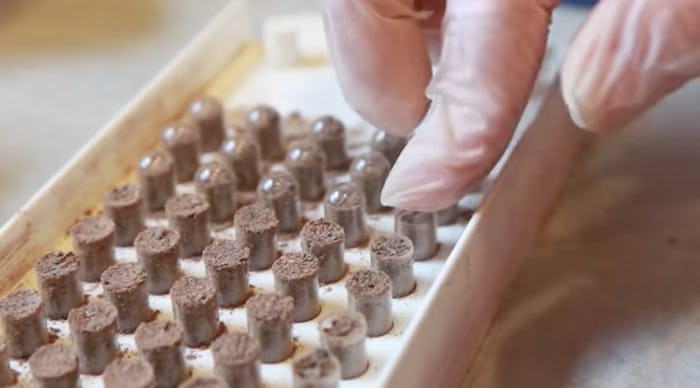If you're hopping on the placenta bandwagon and hoping to put your discarded organ to some postpartum use, you might be Googling all sorts of "weird" placenta questions. From encapsulation to smoothies to creating a pâté, there's more than a few ways to ingest your placenta post-birth. If encapsulation is your placenta brand of choice, though, you might be wondering how your finances will fare. So, how much do placenta pills cost? Well, my pregnant and/or postpartum friend, they're definitely not cheap. Then again, can you really put a price on post-baby health?
First thing's first, of course: what exactly are these so-called placenta pills? Otherwise often known as placental encapsulation, a placenta pill is a way for a postpartum woman to ingest her own placenta in pill form. According to the American Pregnancy Association (APA), "Placental encapsulation is the practice of ingesting the placenta after it has been steamed, dehydrated, ground, and placed into pills."
Why might one want to ingest her own placenta, you might ask? Well, placenta pills have been purported to have various health benefits for the mother, including decreasing her risk of postpartum depression, increasing her iron, and increasing her milk production, according to a study published by the National Institute of Child Health and Human Development (NIH). BabyCenter also says people in favor of placenta consumption believe it can raised your energy and level off your hormones. It's important to keep in mind, however, that placental encapsulation, or ingesting your placenta in any form, is a fairly controversial practice with no scientifically proven health benefits, according to the same report published by NIH.
While some contend that women have been ingesting placenta for centuries, others consider it to be a relatively new fad that's cropped up in the last few decades, essentially gaining popularity since the 1970s. But whether it's new or old, there have been few scientific studies on whether it's actually beneficial for postpartum women. In fact, the majority of information made available about placenta encapsulation is purely anecdotal.
If you're interested in placenta pills, you can make your own or you can hire a placental encapsulation specialist to make them for you. No matter who is making the pills, the process involves dehydrating the placenta (often by steaming and baking), then grinding it so that it can be poured into capsules. Belly Belly reports that the standard cost for placenta encapsulation ranges anywhere from $200 - $400 per placenta. Again, that's not cheap for a vast majority of American women and their families. As with any postpartum decision and/or choice regarding your health, it's best to weigh the pros and cons (as well as speak to a registered physician) before purchasing and/or investing in anything substantial.
No matter what, your placenta needs to be refrigerated before encapsulation if it's not going to be done immediately. The APA explains, saying: "It must be kept refrigerated like any other meat product." So keep that in mind. Additionally, if you aren't squeamish about eating cooked placenta, you could skip the multi-step process of encapsulating the placenta (which, again, can be expensive) and just bake it right into a meal, like lasagna or pizza.
Just be sure that you are the only person who is eating your placenta, because there is a risk of passing along blood borne diseases to other people, according to the APA. And a final word of warning: there is currently no government regulation of placenta pills or encapsulation, so you'll have to ingest at your own risk. In fact, Parents warns postpartum women that their placenta could be contaminated, could spread illness to themselves or others, might not give women the desired effects they're looking for, and might taste, well, not the greatest.
In the end, what you put in your body is, of course, up to you. In the case of placenta encapsulation, however, it might cost you a pretty penny.
Watch Romper's new video series, Romper's Doula Diaries:
Check out the entire Romper's Doula Diaries series and other videos on Facebook and the Bustle app across Apple TV, Roku, and Amazon Fire TV.
